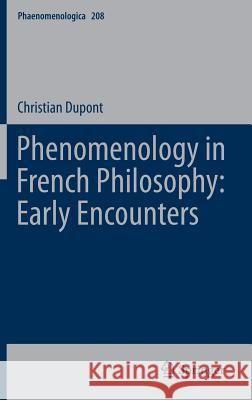Phenomenology in French Philosophy: Early Encounters » książka
Phenomenology in French Philosophy: Early Encounters
ISBN-13: 9789400746404 / Angielski / Twarda / 2013 / 338 str.
This work presents an historical investigation of the early phases in the reception of the phenomenological philosophy of Edmund Husserl in France. Chapter 1 argues that Henri Bergson s insights into lived duration and intuition and Maurice Blondel s genetic descrip tion of action functioned as essential precursors. Chapter 2 details the reception of Husserl and his followers among three successive pairs of French academic philosophers: L on No l and Victor Delbos, Lev Shestov and Jean H ring, Bernard Groethuysen and Georges Gurvitch. Chapter 3 addresses the appropriation of Bergsonian and Blondelian phenomenological insights by Catholic theologians douard Le Roy and Pierre Rousselot. Chapter 4 examines applications of phenomenology by French religious philosophers and neo-Thomists. The principal finding is that philosophical and theological re ceptions of phenomenology in France prior to 1939 proceeded independently due to differences in how Bergson and Blondel influenced these respective spheres and to the different orientations of French philosophers and religious thinkers to Cartesian and Aristotelian/Thomist intellectual traditions.











